| The Knitters: "Poor Little Critter On The Road" (Slash, Jan. 1985) |
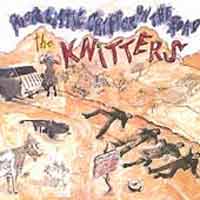 Dieses
Seitenprojekt der Musiker John Doe (v, bg), Exene Cervenka
(v) und D.J. Bonebrake (dr) von der Band "X", unterstützt
vom Blasters-Gitarristen Dave Alvin brachte
zum ersten mal Countrymusik, gespielt von "Punkrockern" (i.w.S.)
auf die Bühne. Damals zwar kein großer kommerzieller Erfolg,
beruft sich heute ein großer Teil der "Americana" /
"No Depression"-Szene auf diese Band als einen der wichtigsten
Einflüsse. Vielleicht passt in gewisser Weise der Vergleich mit
den Velvet Underground: die fanden zu ihrer aktiven
Zeit (1965-70) auch nicht viele Plattenkäufer, aber jeder der es
tat, gründete danach eine Band. Dieses
Seitenprojekt der Musiker John Doe (v, bg), Exene Cervenka
(v) und D.J. Bonebrake (dr) von der Band "X", unterstützt
vom Blasters-Gitarristen Dave Alvin brachte
zum ersten mal Countrymusik, gespielt von "Punkrockern" (i.w.S.)
auf die Bühne. Damals zwar kein großer kommerzieller Erfolg,
beruft sich heute ein großer Teil der "Americana" /
"No Depression"-Szene auf diese Band als einen der wichtigsten
Einflüsse. Vielleicht passt in gewisser Weise der Vergleich mit
den Velvet Underground: die fanden zu ihrer aktiven
Zeit (1965-70) auch nicht viele Plattenkäufer, aber jeder der es
tat, gründete danach eine Band. |
| Emmylou Harris: "Ballad Of The Sally Rose" (Warner, Feb. 1985) |
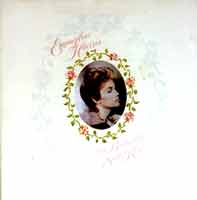 Eine
ungewöhnliche Platte von Emmylou. Nach einigen eher schwächeren
Alben mit Ausflügen in den Mainstream (z.B. das furchtbare "White
Shoes" von 1983) stimmte wieder die musikalisch Qualität (Albert
Lee war seit der 81er-Platte "Evangeline" zum ersten mal
wieder dabei) und erstmalig gab's fast ausschließlich eigenes
Material, von Emmylou zusammen mit ihrem damaligen musikalischen und
Lebenspartner Paul Kennerley verfasst. Eine
ungewöhnliche Platte von Emmylou. Nach einigen eher schwächeren
Alben mit Ausflügen in den Mainstream (z.B. das furchtbare "White
Shoes" von 1983) stimmte wieder die musikalisch Qualität (Albert
Lee war seit der 81er-Platte "Evangeline" zum ersten mal
wieder dabei) und erstmalig gab's fast ausschließlich eigenes
Material, von Emmylou zusammen mit ihrem damaligen musikalischen und
Lebenspartner Paul Kennerley verfasst. |
| The Smiths: "Meat Is Murder" (Rough Trade, Feb. 1985) |
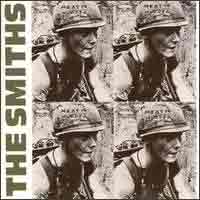 Das
war Liebe auf den zweiten Blick.: Ich kannte die Band nur von einem
Rockpalastkonzert aus einem Hamburger Club, das mich kaum beeindruckt
hatte. Ich konnte mich nur noch daran erinnern, dass Sänger die
ganze Zeit mit weißen Gladiolen (oder Tulpen?) rumhantiert hatte.
Als ich diese Platte (ihre dritte, wenn man Single/Maxi-Kompilation
"Hateful Of Hollow" mitzählt) dann in einem Sonderangebotsständer
fand, entschloss ich mich nach langen zögern zum Kauf - den ich
bis heute nicht bereut habe. Sänger/Texter Morrissey und
Gitarrist/Komponist Johnny Marr überzeugen mit ihren Liedern
und mit ihrem einzigartigen Sound. Mal wieder einer der wenigen Fälle,
wo mein Geschmack und der Massengeschmack "gewisse Berührungspunkte"
haben. Das
war Liebe auf den zweiten Blick.: Ich kannte die Band nur von einem
Rockpalastkonzert aus einem Hamburger Club, das mich kaum beeindruckt
hatte. Ich konnte mich nur noch daran erinnern, dass Sänger die
ganze Zeit mit weißen Gladiolen (oder Tulpen?) rumhantiert hatte.
Als ich diese Platte (ihre dritte, wenn man Single/Maxi-Kompilation
"Hateful Of Hollow" mitzählt) dann in einem Sonderangebotsständer
fand, entschloss ich mich nach langen zögern zum Kauf - den ich
bis heute nicht bereut habe. Sänger/Texter Morrissey und
Gitarrist/Komponist Johnny Marr überzeugen mit ihren Liedern
und mit ihrem einzigartigen Sound. Mal wieder einer der wenigen Fälle,
wo mein Geschmack und der Massengeschmack "gewisse Berührungspunkte"
haben. |
| Richard Thompson: "Across A Crowded Room" (Polydor, März 1985) |
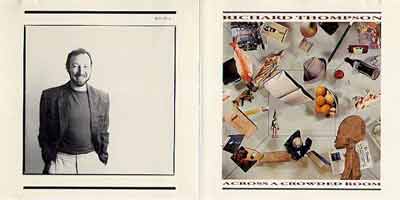 Ein mir aus unerklärlichen Gründen von der Kritik nicht sonderlich
geschätztes Album vom besten britischen Singer/Songwriter/Guitarplayer
(in dieser Kombination unerreicht: es gibt wahrscheinlich bessere Sänger,
vielleicht bessere Songschreiber, aber kaum bessere Gitarristen mit
einem eigenen, unverwechselbaren Ton!). Die Platte enthält mit
dem Eröffnungslied "When The Spell is Broken" eines meiner
Lieblinx-Thompson-Lieder mit dem wunderbaren Wechselgesang von Thompson
und dem Folkrockpaar Clive Gregson/Christine Collister.
Und den Abschluss bildet in bester "Night Comes In" Tradition
(d.h. u.a.: ein beeindruckendes Gitarrensolo) "Love in a faithless
country" mit dem etwas merkwürdigen Chor der "Soultanas".
Ein mir aus unerklärlichen Gründen von der Kritik nicht sonderlich
geschätztes Album vom besten britischen Singer/Songwriter/Guitarplayer
(in dieser Kombination unerreicht: es gibt wahrscheinlich bessere Sänger,
vielleicht bessere Songschreiber, aber kaum bessere Gitarristen mit
einem eigenen, unverwechselbaren Ton!). Die Platte enthält mit
dem Eröffnungslied "When The Spell is Broken" eines meiner
Lieblinx-Thompson-Lieder mit dem wunderbaren Wechselgesang von Thompson
und dem Folkrockpaar Clive Gregson/Christine Collister.
Und den Abschluss bildet in bester "Night Comes In" Tradition
(d.h. u.a.: ein beeindruckendes Gitarrensolo) "Love in a faithless
country" mit dem etwas merkwürdigen Chor der "Soultanas". |
| The Velvet Underground: "VU" (Verve, März 1985) |
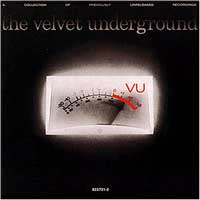 Resteverwertung? Leichenfledderei? Irgendwie schon, aber trotzdem eine
tolle Platte - zumindest für die Lou Reed/Velvet Underground-Fans!
Nach drei phantastischen Alben für Verve/MGM 1967-69 ("The
Velvet Underground & Nico", "White Light/White Heat"
und "The Velvet Underground")
wurde der Band vor Fertigstellung eines vierten Albums der Plattenvertrag
gekündigt. Danach ging es dann mit dem "echten" vierten
Album "Loaded" bei Atlantic
weiter. Bei den Vorbereitungen zur Wiederveröffentlichung der ersten
drei Alben wurden dann die Bänder mit den hier versammelten Liedern
"entdeckt", wobei ich mich frage, wieso man so was erst "entdecken"
muss, statt es direkt vernünftig zu archivieren!
Resteverwertung? Leichenfledderei? Irgendwie schon, aber trotzdem eine
tolle Platte - zumindest für die Lou Reed/Velvet Underground-Fans!
Nach drei phantastischen Alben für Verve/MGM 1967-69 ("The
Velvet Underground & Nico", "White Light/White Heat"
und "The Velvet Underground")
wurde der Band vor Fertigstellung eines vierten Albums der Plattenvertrag
gekündigt. Danach ging es dann mit dem "echten" vierten
Album "Loaded" bei Atlantic
weiter. Bei den Vorbereitungen zur Wiederveröffentlichung der ersten
drei Alben wurden dann die Bänder mit den hier versammelten Liedern
"entdeckt", wobei ich mich frage, wieso man so was erst "entdecken"
muss, statt es direkt vernünftig zu archivieren!
Versammelt sind hier zwei Aufnahmen von 1968 noch mit John Cale,
die aber wohl nicht auf "White Light/White Heat" gepasst hätten,
während der Rest mit seinem Nachfolger Doug Yule wohl schon
für das von Verve gecancelte vierte Album vorgesehen waren.
Noch mal zurück zum Vorwurf "Resteverwertung": viele
der hier versammelten "Outtakes" wie z.B. "Ocean"
und "Stephanie Says" sind inzwischen längst zu Velvet-Klassikern
geworden, andere wurden von Lou Reed für seine Soloalben
neu eingespielt.

 Mehr ...
Mehr ...
| "Can't Stand It Anymore" ist ein Abgehrocker,
"Inside Of Your Heart" richtiger Motownpop und "Stephanie
Says" eine wunderschöne Schnulze, die in eine Reihe mit "Sunday
Morning" und "Pale Blue Eyes" gehört. Die Aufnahmen
auf der CD stammen, bis auf zwei Ausnahmen, von 1969, also aus der Zeit
nach der dritten LP Velvet Underground. Nachdem sie jahrelang auf Bootlegs
herumgeisterten, brachte die Plattenfirma sie 1984 neu abgemischt auf den
Markt. Die Lieder zeigen eine ungeheuer potente Gruppe, die das Zeug dazu
gehabt hätte, der Welt noch eine ganze Reihe hypnotischer Werke zu
schenken. Ob Lou Reed das nun ebenso sieht oder nicht, seine Lieder wurden
nie wieder so gut gespielt wie von Velvet Underground. Und das gilt auch
für die Zeit nach dem Ausstieg von John Cale. Keine überflüssigen
Outtakes, sondern essenzieller Stoff der Gruppe. (Gregor Kannberg, amazon) |
|
|
This one's been quite often hailed as the 'Great Lost blah blah blah',
but it certainly depends on what exact sense you include in the expression.
Me, I suppose that to a certain extent it is great, not to mention lost
(and found), but I can't help comparing these outtakes to the four studio
regulars and the subsequent recordings of many of them on some of Lou
Reed's solo albums, and a slightly noticeable 'eeh' escapes my lips. Now
and then...
See, when these outtakes, most of them destined for the Underground's
fifth regular album that never happened due to Lou's and the band's record
company's obstinacy, were discovered by the record company in the early
Eighties, the world was already hungry for more fresh Velvets' recordings,
and the critics and the public fell upon them and extracted them and praised
them with the highest praise. How could they do otherwise? By then, everybody
with a more or less significant status in rock music had already proclaimed
themselves descended directly - if not from Lou Reed's guitar, then from
John Cale's viola. The album and its successor, Another View, were bound
to be deified. But never worry - here I go to save the world and debunk
the myth!
A clear example of how much this album is overrated is how all the critics
who used to praise Lou Reed's solo albums suddenly turn their backs on
him and say that all of these outtakes are superior to the later versions
on Lou's solo albums. Dude, if that's how it really is, either I don't
deserve to live or everybody else has got cotton wads in their ears. More
probably, nobody has ever really compared the two groups of songs. To
my notion, at least five of the ten songs on here have later been included
by Lou on his solo projects: 'I Can't Stand It', 'Ocean', and 'Lisa Says'
ended up on his debut album (Lou Reed), 'Andy's Chest', as everybody knows,
got re-recorded for Transformer, and 'She's My Best Friend' turned out
to be put on Coney Island Baby - six years after the 'rough mix' of VU.
And, all right, so 'Ocean' kinda sucks: but it sucks on both versions,
and at least the one on Lou Reed has enough 'static power' to make it
seem impressive.
But 'I Can't Stand It'? It begins its life on VU as a catchy, solid, but
very crude demo (and what's with that drum sound? I bet you anything it
was re-recorded in the Eighties - it sounds electronically enhanced!),
only to be tightened up and hardened up on Lou Reed to make a truly unforgettable
experience. 'Lisa Says'? Great song, but who on earth would prefer the
hoarse, out of tune screams 'Lisa sa-a-a-a-a-ys' on the VU version to
the moody, gentle, so unbelievably charming 'Lisa says... oh noooo...
Lisa says' of Lou Reed. (It's the 'oh no' part I miss so much, understand
that). Same thing goes for 'Andy's Chest' and 'She's My Best Friend'.
The overall problem with all these versions is understandable: They Are
Not Moody. That's very important. On Lou's solo records, all of these
songs took over an independent, breathing life of their own - small autonomous
worlds in their own rights. Here, it's just a bunch of solid, guitar-driven
demo versions with interesting, but not ideal melodies. I'll admit that
'She's My Best Friend' may be a bit more catchy and bouncy than on the
slow, dreary version on Coney Island Baby, but it's also more generic
(Mark Prindle said it reminded him of the Association, and I couldn't
agree more).
But don't get me wrong. This is still quite a good little record. Quite
simply, there ain't a single truly bad song here - and so, if you're afraid
of the Velvets' weirdness, this will be the natural thing to buy after
the self-titled record and Loaded. All of the above-mentioned songs, with
the possible exception of 'Ocean' and 'She's My Best Friend', are still
first-rate material, and that's not all.
Only two of the tracks here date to the Cale era, but it shows: 'Stephanie
Says' is a gorgeous ballad that reminds me a little of 'Sunday Morning'
because the melodies are similar (yet it's not a rip-off) and there's
a glockenspiel part on both, but it's also highlighted by some moving,
strangely inobtrusive violin playing by John, and it's a great highlight
of the band's 'softest' side. And 'Temptation Inside Your Heart' has Lou
and Sterling Morrison exchange some bizarre dialogue lines in between
the lines of the song (which is a rather generic rocker by itself), such
as 'Motown! You don't look like Martha and the Vandellas' and 'Lock the
door this time', which roll on at great speed and great fun.
As for the Doug era, there's some more angry rock'n'roll (the never ending,
but quite infuriating 'Foggy Notion'), some more routine, but pleasant
pop ('One Of These Days'), and even a Moe Tucker-sung album conclusion
- a great three-chord piano ballad called 'I'm Sticking With You' that
she sings in the same childish, naive, charming little 'voicelet' of hers.
In other words, the record's pretty diverse, and hardcore fans will definitely
get a blast out of it. I do like it - get this, I do like it - but I do
have the complaint I just voiced. The album's not finished, and that is
a bad thing: turns out that the Velvets did depend on the arrangements
and production after all, no matter how people like to emphasize the rawness
and 'purity' of their sound. Get this record at all costs, but I wouldn't
really advise you to do that until you've assimilated the first two Lou
Reed solo albums - at least, that way you won't be accused of giving in
to all the hype. (from George
Starostin's Reviews)
|
|
| "del Amitri" (Chrysalis, Mai 1985) |
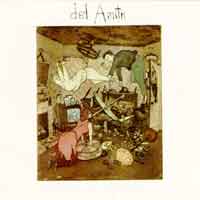 Sie fielen mir als Vorgruppe von Lloyd Cole bei einem Konzert in
der Bochumer Zeche angenehm auf. Das Debüt der schottischen Band
um den Sänger und Bassisten Justin Currie und den Gitarristen
Ian Harvie blieb damals bei uns aber relativ unbeachtet und es
war schwierig, die Platte aufzutreiben. Erst vier Jahre später
(und mit neuem Plattenvertrag) kam mit der Single "Nothing Ever
Happens" aus dem Album "The
Waking Hour" der grosse Durchbruch.
Sie fielen mir als Vorgruppe von Lloyd Cole bei einem Konzert in
der Bochumer Zeche angenehm auf. Das Debüt der schottischen Band
um den Sänger und Bassisten Justin Currie und den Gitarristen
Ian Harvie blieb damals bei uns aber relativ unbeachtet und es
war schwierig, die Platte aufzutreiben. Erst vier Jahre später
(und mit neuem Plattenvertrag) kam mit der Single "Nothing Ever
Happens" aus dem Album "The
Waking Hour" der grosse Durchbruch. |
| Green On Red: "Gas Food Lodging" (Zippo, Mai 1985) |
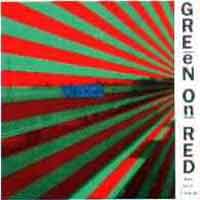 Eines von vielen guten Alben der Band um den Sänger Dan Stuart und den Keyboarder Chris Cacavas.
Eines von vielen guten Alben der Band um den Sänger Dan Stuart und den Keyboarder Chris Cacavas.

 Mehr ...
Mehr ...
|
Much like their pals the Dream Syndicate, Green on Red used up nearly
all their psychedelic influences early on, and 1985's Gas Food Lodging
found Dan Stuart and company veering into country-inflected roots rock
that dovetailed nicely with the populist themes Stuart had begun to explore
in his lyrics. Opening with "That's What Dreams," a tough but
moving first-person tale of a working man struggling to hold on to his
dignity, Gas Food Lodging takes a long look at the sometimes-fractured
state of the American psyche during the Reagan years, as seen through
the eyes of a low-budget rock band out on the road. Of course, Dan Stuart's
America is populated by drunks, losers, drifters, and psychopaths, but
there's a genuine measure of compassion in his portrayal of this collection
of lost souls, and this lineup of the band -- with Chuck Prophet IV on
guitar and Chris Cacavas on organ -- created evocative music that added
depth and detail to Stuart's grubby vision. Gas Food Lodging set a template
for the music Green on Red would make in the future, but they rarely hit
their targets as squarely as they did here; there's an emotional weight
and a ring of truth to this material that missing from much of the band's
later work, and while closing with "We Shall Overcome" might
seem like an especially obvious gesture, through sheer bloodshot sincerity
this band makes it work -- and makes it genuinely moving. Gas Food Lodging
is too loose and deliberately ramshackle to support the title of masterpiece,
but calling it Green on Red's best album will do nicely.
(by Mark Deming , AMG) |
|
| "Lone Justice" (Geffen, Mai 1985) |
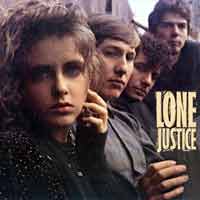 Ein geniales Debüt der damals knapp 20jährigen Maria McKee
mit ihrer "Begleitband" (Ryan Hedgecock an der Gitarre,
Marvin Etzioni am Bass und Don Heffington am Schlagzeug).
Ich habe damals ein paar Lieder von ihrem mittäglichen Auftritt
beim "Rock am Ring" auf Video mitgeschnitten, bei dem Maria
in ihrem bäuerlichen Schlabberkleid einfach hinreißend aussah
und wie eine junge Göttin sang. Zwar schrieb sie auch damals schon
gute eigene Songs ("Sweet Sweet Baby" zusammen mit Little
Steven und "Wait 'til We Get Home" mit Gitarrist Hedgecock),
herausragend ist aber "Ways To be Wicked", das Tom Petty
für sie verfasste und "Don't Toss Us Away" von ihrem
Stiefbruder Bryan McLean, der mal in den 60ern bei der Band Love
war. Bassist Etzioni zeigt auch durch drei Songs seine Songwriterqualitäten:
so stammt von ihm der geniale Rocker "East Of Eden".
Ein geniales Debüt der damals knapp 20jährigen Maria McKee
mit ihrer "Begleitband" (Ryan Hedgecock an der Gitarre,
Marvin Etzioni am Bass und Don Heffington am Schlagzeug).
Ich habe damals ein paar Lieder von ihrem mittäglichen Auftritt
beim "Rock am Ring" auf Video mitgeschnitten, bei dem Maria
in ihrem bäuerlichen Schlabberkleid einfach hinreißend aussah
und wie eine junge Göttin sang. Zwar schrieb sie auch damals schon
gute eigene Songs ("Sweet Sweet Baby" zusammen mit Little
Steven und "Wait 'til We Get Home" mit Gitarrist Hedgecock),
herausragend ist aber "Ways To be Wicked", das Tom Petty
für sie verfasste und "Don't Toss Us Away" von ihrem
Stiefbruder Bryan McLean, der mal in den 60ern bei der Band Love
war. Bassist Etzioni zeigt auch durch drei Songs seine Songwriterqualitäten:
so stammt von ihm der geniale Rocker "East Of Eden".

 Mehr ...
Mehr ...
Few new bands receive the kind of critical buzz that Lone Justice generated prior to the release of their first album in 1985, and one senses the band (not to mention producer Jimmy Iovine and Geffen Records) wanted to deliver something special to merit the hype. Which was not necessarily a good thing; Lone Justice is an album that tries so hard to be great that it sometimes ends up tripping over its own ambitions. The record leaves no doubt that the first edition of Lone Justice was a very good band; on the best cuts, Maria McKee's voice sounds like a force of nature, bassist Marvin Etzioni and bassist Don Heffington are a strong and imaginative rhythm section whether they were playing souped-up country shuffles or fifth-gear rock & roll, and if guitarist Ryan Hedgecock isn't quite a virtuoso, he's solid and inspired when he gets to step to the forefront. But guest keyboardist Benmont Tench and the other high-priced help (including Little Steven, Mike Campbell, and an uncredited Annie Lennox) often overwhelm the group's personality, and while McKee's songs celebrating the heart and soul of rural America are unquestionably sincere, they don't always ring true ("After the Flood" and "Pass It On" sound more like writing exercises than narratives centered around believable characters), and they also seem to inspire Iovine's most bombastic production decisions. Where Lone Justice succeeds is on straight-ahead rockers like "East of Eden" and "Working Late," the C&W weeper "Don't Toss Us Away," and the tough "love gone bad" number "Way to Be Wicked," all of which prove that this band really did have the goods. In the wake of the 1990s alt-country movement, in which dozens of bands mined similar musical territory with more satisfying results, Lone Justice sounds like an example of too many cooks spoiling the soup; there's enough good stuff to make it worth hearing, but its hard not to wish Lone Justice had gotten the sort of sympathetic but hands-off production that allowed Wilco and the Jayhawks to do their best work.
(by Mark Deming, All Music Guide)
|
| "Dinosaur" (Homestead, Juni 1985) |
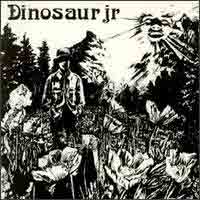 Dieses Gitarrentrio war damals eine Offenbarung. Sänger und Gitarrist
J. Mascis, Bassist Lou Barlow (später mit The
Folk Implosion bekannt geworden) und Drummer Murph spielten
ihre Mischung aus Punk und Metal, die viele Leute später "Grunge"
nannten. Ich besitze das seltene Original-Vinyl von Homestead, noch
ohne den Zusatz "Jr.", den die Band später führen
musste, da sie von der San Francisco-Hippie-Band "The Dinosaurs"
verklagt wurden, was mir insofern ein bisschen peinlich ist, als in
dieser "Altherrenband" ein paar Leute mehr oder weniger erfolgreich
spielten, die eigentlich zu meinen alten Helden gehören: Robert
Hunter (Grateful Dead-Texter),
John Cipollina (Quicksilver Messenger
Service), Merl Saunders (Jerry
Garcia-Keyboarder) und Barry Melton (County Joe & The
Fish-Gitarrist und heutzutage Rechtsanwalt - war das wohl seine Idee?).
Dieses Gitarrentrio war damals eine Offenbarung. Sänger und Gitarrist
J. Mascis, Bassist Lou Barlow (später mit The
Folk Implosion bekannt geworden) und Drummer Murph spielten
ihre Mischung aus Punk und Metal, die viele Leute später "Grunge"
nannten. Ich besitze das seltene Original-Vinyl von Homestead, noch
ohne den Zusatz "Jr.", den die Band später führen
musste, da sie von der San Francisco-Hippie-Band "The Dinosaurs"
verklagt wurden, was mir insofern ein bisschen peinlich ist, als in
dieser "Altherrenband" ein paar Leute mehr oder weniger erfolgreich
spielten, die eigentlich zu meinen alten Helden gehören: Robert
Hunter (Grateful Dead-Texter),
John Cipollina (Quicksilver Messenger
Service), Merl Saunders (Jerry
Garcia-Keyboarder) und Barry Melton (County Joe & The
Fish-Gitarrist und heutzutage Rechtsanwalt - war das wohl seine Idee?). |
| "Suzanne Vega" (A&M, Juni 1985) |
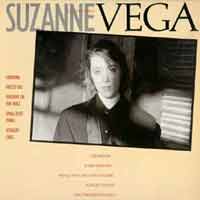 Mitten in den ungemütlichen 80ern debütiert diese New Yorker Sängerin/Songschreiberin
mit einem Hitalbum! "Marlene On The Wall" war damals ein Ohrwurm,
dem man sich nicht entziehen konnte. Ihre bekanntesten Songs, "Luka"
und "Tom's Diner" findet man aber erst auf dem Nachfolger
"Solitude Standing"
von 1987. Als Produzent neben Steve Addabo ist ein alter Bekannter
dabei: Lenny Kaye von der Patti
Smith Group.
Mitten in den ungemütlichen 80ern debütiert diese New Yorker Sängerin/Songschreiberin
mit einem Hitalbum! "Marlene On The Wall" war damals ein Ohrwurm,
dem man sich nicht entziehen konnte. Ihre bekanntesten Songs, "Luka"
und "Tom's Diner" findet man aber erst auf dem Nachfolger
"Solitude Standing"
von 1987. Als Produzent neben Steve Addabo ist ein alter Bekannter
dabei: Lenny Kaye von der Patti
Smith Group. |
| Jacobites: "Robbespierre's Velvet Basement" (Glass, Aug. 1985) |
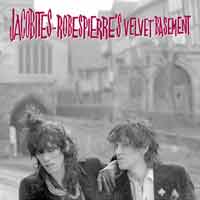 Das frühe Meisterwerk der englischen Sänger/Gitarristen Nikki
Sudden und Dave Kusworth, begleitet von Nikkis Bruder Epic
Soundtrack am Schlagzeug und Mark Lemon am Bass.
Das frühe Meisterwerk der englischen Sänger/Gitarristen Nikki
Sudden und Dave Kusworth, begleitet von Nikkis Bruder Epic
Soundtrack am Schlagzeug und Mark Lemon am Bass. |
| R.E.M.: "Fables Of The Reconstruction" (I.R.S., Aug. 1985) |
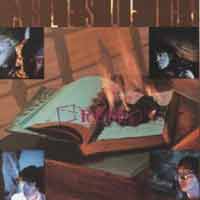 Michael
Stipe, Peter Buck, Mike Mills und Bill Berry
auf dem Weg zum Weltruhm, dort aber noch nicht ganz angekommen. Dieses
letzte Album vor der ersten richtigen Hitsingle "The One I Love",
produziert von Joe Boyd (Fairport
Convention, Incredible String Band,
etc.), gilt für viele als Fehlschlag, obwohl es für mich der
erste Zugang zur Band war. Ich liebe das Album trotz aller negativen
Kritiken heiß und innig. Michael
Stipe, Peter Buck, Mike Mills und Bill Berry
auf dem Weg zum Weltruhm, dort aber noch nicht ganz angekommen. Dieses
letzte Album vor der ersten richtigen Hitsingle "The One I Love",
produziert von Joe Boyd (Fairport
Convention, Incredible String Band,
etc.), gilt für viele als Fehlschlag, obwohl es für mich der
erste Zugang zur Band war. Ich liebe das Album trotz aller negativen
Kritiken heiß und innig. |
| The Waterboys: "This Is The Sea" (Chrysalis/Ensign, Sept. 1985) |
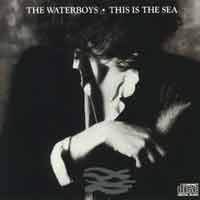 Das dritte Album von Mike Scott, zusammen mit seinen Mitstreitern
Karl Wallinger und Anthony Thistlethwaite, ist das beste
dieser "Band" (eigentlich war das ja immer eher Scotts Soloprojekt).
Die Single "Whole Of The Moon" ist absolut genial!
Das dritte Album von Mike Scott, zusammen mit seinen Mitstreitern
Karl Wallinger und Anthony Thistlethwaite, ist das beste
dieser "Band" (eigentlich war das ja immer eher Scotts Soloprojekt).
Die Single "Whole Of The Moon" ist absolut genial!

 Mehr ...
Mehr ...
Expanding the epic, multi-layered sound of A Pagan Place, This Is the Sea is a more ambitious yet more successful record, since it finds Mike Scott at his melodic peak. Consequently, the album has enough strong, accessible moments to make his indulgences forgivable.
(by Stephen Thomas Erlewine, All Music Guide)
|
| Bangles: "Different Light" (Columbia, Okt. 1985) |
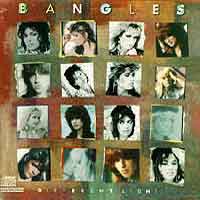 Die Mädels habe ich seit ihrem Auftritt Frühjahr 1986 in der Zeche
Bochum - noch vor einem überschaubar großen Publikum - in
mein Herz geschlossen. Fünf Meter vor Susanna Hoffs habe
ich gesessen und war sprachlos. Im Laufe des Sommers wurde die Platte,
vor allem der Prince-Titel "Manic Monday", dann zum
Dauerbrenner und nutzte dabei leider ein wenig ab. Die beiden folgenden
Alben habe ich dann nicht mehr so richtig zur Kenntnis genommen, aber
"Different Light" bleibt wichtig, u.a. weil es auch von den
anderen drei Ladies (Gitarristin Vicki Peterson, später
bei den Continental Drifters;
ihrer trommelnden Schwester Debbie Peterson und Bassistin Michael
Steele) tolle kompositorische und gesangliche Beiträge gab.
Anerkennung gehört ihnen u. a. weil sie mit "September Gurls"
von Alex Chilton eines meiner absoluten Lieblingslieder aufgenommen
haben.
Die Mädels habe ich seit ihrem Auftritt Frühjahr 1986 in der Zeche
Bochum - noch vor einem überschaubar großen Publikum - in
mein Herz geschlossen. Fünf Meter vor Susanna Hoffs habe
ich gesessen und war sprachlos. Im Laufe des Sommers wurde die Platte,
vor allem der Prince-Titel "Manic Monday", dann zum
Dauerbrenner und nutzte dabei leider ein wenig ab. Die beiden folgenden
Alben habe ich dann nicht mehr so richtig zur Kenntnis genommen, aber
"Different Light" bleibt wichtig, u.a. weil es auch von den
anderen drei Ladies (Gitarristin Vicki Peterson, später
bei den Continental Drifters;
ihrer trommelnden Schwester Debbie Peterson und Bassistin Michael
Steele) tolle kompositorische und gesangliche Beiträge gab.
Anerkennung gehört ihnen u. a. weil sie mit "September Gurls"
von Alex Chilton eines meiner absoluten Lieblingslieder aufgenommen
haben. |
| The Long Ryders: "State Of Our Union" (Island, Okt. 1985) |
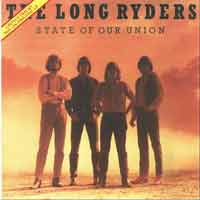 Die Ryders waren eine typische Band des L.A.-Psychedelic-Rockszene aus den
frühen 80ern (Blasters, Green
On Red, Dream Syndicate,
etc.) mit starken Wurzeln in der Countrymusik und natürlich, wie
schon im Bandnamen deutlich wird, mit Byrds-Bezügen. Dieses
Album wurde in London von Will Birch, dem ehemaligen Drummer
der Kursaal Flyers produziert.
Die Ryders waren eine typische Band des L.A.-Psychedelic-Rockszene aus den
frühen 80ern (Blasters, Green
On Red, Dream Syndicate,
etc.) mit starken Wurzeln in der Countrymusik und natürlich, wie
schon im Bandnamen deutlich wird, mit Byrds-Bezügen. Dieses
Album wurde in London von Will Birch, dem ehemaligen Drummer
der Kursaal Flyers produziert. |
| Rain Parade: "Crashing Dreams " (Island, Okt. 1985) |
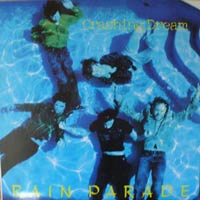 Durch den Gitarristen John Thoman war die Band aus L.A. wieder
zum Quintett angewachsen und hatte genauso wie ihre lokale "Konkurrenz"
von den Long Ryders bei Island einen Majorvertrag
unterzeichnet, aber leider war nach diesem schönen Album Schluss
mit der Band. Bassist Steve Roback, Keyboarder Will Glenn
und Gitarren-Neuzugang Thoman gründeten anschließend
die ebenso guten und ebenfalls wenig erfolgreichen Viva Saturn,
die ich mir eigentlich auch mal wieder anhören müsste. Sänger/Gitarrist
Matt Piucci vertrat danach Frank Sampedro auf dem merkwürdigen
Crazy-Horse-ohne-Neil-Young-Album "Left For Dead",
während jener mit Neil Youngs "Freedom"
zu tun hatte.
Durch den Gitarristen John Thoman war die Band aus L.A. wieder
zum Quintett angewachsen und hatte genauso wie ihre lokale "Konkurrenz"
von den Long Ryders bei Island einen Majorvertrag
unterzeichnet, aber leider war nach diesem schönen Album Schluss
mit der Band. Bassist Steve Roback, Keyboarder Will Glenn
und Gitarren-Neuzugang Thoman gründeten anschließend
die ebenso guten und ebenfalls wenig erfolgreichen Viva Saturn,
die ich mir eigentlich auch mal wieder anhören müsste. Sänger/Gitarrist
Matt Piucci vertrat danach Frank Sampedro auf dem merkwürdigen
Crazy-Horse-ohne-Neil-Young-Album "Left For Dead",
während jener mit Neil Youngs "Freedom"
zu tun hatte.
(15.07.2008)

 Mehr ...
Mehr ...
|
The group's final album and its first for a major label was no way to end a career that started out so promising, but it did deliver in some areas. Vocalist/guitarist David Roback had left the band � as had drummer Eddie Kalwa, leaving out some core elements that had managed to gel together so well on previous outings. Ultimately, the murky, psychedelic waters of previous releases had become elusive. Upon the first listen, the major flaw that you hear is the increase in production that results in waves of synthesizer accents that do little to add to the flavor of the group. The track "Depending on You" is certainly blessed with some strong guitar leads, but is marred by the shiny blasts of synthetics. Rain Parade's greatness arose out of excellent songs and guitar work, but also out of an adherence to a timeless sound. Modern embellishments did not suit them well. "Don't Feel Bad" is perhaps the biggest victim of this. The song is great with drums spiraling backwards, guitars fluttering up and down, the bass backtracking while still sounding nimble and flexible as the harmonies float � but the stabs of synth and drum treatments turn the song into a relic of the time. The slower moments of the record work their charm. "My Secret Country" is a nice balance of acoustic guitars and harmonies but is ultimately muddied by an ending that creeps up too soon. It's "Fertile Crescent" that is probably the most perfectly realized song on the album, with its guitar jangle and a perfect harmony of build-up and release. "Only Business" also works well with its stripped-down and slightly broken approach that uses restraint in a way that could have suited a number of the other tracks on the album. It's an unfortunate ending (not unfortunately uncommon, either) that sees the group's final official release marred by a major label's input, distorting what should have been Rain Parade's greatest statement.
(by Jon Pruett, All Music Guide)
|
|
| Tom Waits: "Rain Dogs" (Island, Okt. 1985) |
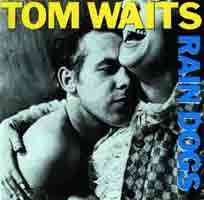 Nach "Swordfishtrombones"
hält Waits locker den selbst gesetzten Standard, auch wenn das
alles natürlich nicht mehr ganz so überraschend daher kommt,
wie zwei Jahre zuvor!
Nach "Swordfishtrombones"
hält Waits locker den selbst gesetzten Standard, auch wenn das
alles natürlich nicht mehr ganz so überraschend daher kommt,
wie zwei Jahre zuvor!

 Mehr ...
Mehr ...
Rain Dogs gilt als das von der Kritik am meisten gelobte Album von Tom Waits und folgt dem neuen musikalischen Weg, den Waits mit Swordfishtrombones eingeschlagen hatte. Rain Dogs, das zusammen mit Swordfishtrombones und Franks Wild Years die Mitte einer De-facto-Trilogie bildet, ist das erste von Waits' Alben, das in New York, in einem Keller in Lower Manhattan, geschrieben wurde. Rain Dogs ist ein 53-minütiges, 19 Titel umfassendes Monster, eine Art mutierte musikalische »Canterbury Tales« des späten 20. Jahrhunderts mit einer sich verändernden Band. Jahrhunderts mit einer sich wandelnden Band. Es gibt Banjos und Marimbas, Bogensägen, Parade-Trommeln und heulende Bläser (und Keith Richards und Marc Ribot) auf diesem ausgelassenen, rauen Werk - und Waits, der seine Stimme auf immer verrücktere und wildere Weise einsetzt. Die Songs sind Geschichten, Sagen, Klagelieder, Zusammenbrüche, Charakterstudien, Komödien und Kabarettnummern. Da gibt es das schmerzhafte »Hang Down Your Head« und die bewegende Hymne »Downtown Train«, die von Patti Smith und Rod Stewart gecovert wurde.
Waits prägte den Begriff »Rain Dog«, eine Anspielung auf Hunde, die sich verirren, wenn die Gerüche von Stürmen weggespült werden. Zu den verirrten Hunden auf dem Album gehören: ruppige, umherziehende Handelsmarines (»Singapore«), ein Akkordeonspieler in einem Schlachthaus (»Cemetery Polka«), ein »Jockey voll Bourbon« (auch der Songtitel), eine verlassene, zurückgezogene Frau (»Time«), ein »Gun Street Girl«, die alten Betrunkenen und Stricher vom Union Square und sogar Waits selbst: Aboard a shipwreck train / Give my umbrella to the Rain Dogs / For I am a Rain Dog, too ...
Ursprünglich 1985 auf Island Records veröffentlicht, wurde das Album zum ersten Mal überhaupt vom originalen ½"-Flat-Masterband neu gemastert und von Tom Waits und Kathleen Brennan persönlich betreut. Gemastert wurde es von Chris Bellman bei Bernie Grundman Mastering unter der Leitung von Waits' langjährigem Tontechniker Karl Derfler. Die Verpackung des Albums wurde ebenfalls restauriert.
With its jarring rhythms and unusual instrumentation -- marimba, accordion, various percussion -- as well as its frequently surreal lyrics, Rain Dogs is very much a follow-up to Swordfishtrombones, which is to say that it sounds for the most part like The Threepenny Opera being sung by Howlin' Wolf. The chief musical difference is the introduction of guitarist Marc Ribot, who adds his noisy leads to the general cacophony. But Rain Dogs is sprawling where its predecessor had been focused: Tom Waits' lyrics here sometimes are imaginative to the point of obscurity, seemingly chosen to fit the rhythms rather than for sense. In the course of 19 tracks and 54 minutes, Waits sometimes goes back to the more conventional music of his earlier records, which seems like a retreat, though such tracks as the catchy "Hang Down Your Head," "Time," and especially "Downtown Train" (frequently covered and finally turned into a Top Ten hit by Rod Stewart five years later) provide some relief as well as variety. Rain Dogs can't surprise as Swordfishtrombones had, and in his attempt to continue in the direction suggested by that album, Waits occasionally borders on the chaotic (which may only be to say that, like most of his records, this one is uneven). But much of the music matches the earlier album, and there is so much of it that that is enough to qualify Rain Dogs as one of Waits' better albums.
(by William Ruhlmann, All Music Guide)
|
| 10,000 Maniacs: "The Wishing Chair" (Elektra, Nov. 1985) |
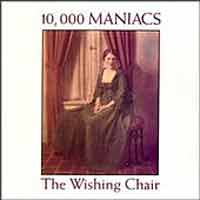 Das zweite Album der Band um die Sängerin Natalie Merchant,
nach dem Debüt beim Bonner Normal-Label jetzt bei Elektra, einer
renommierten großen Firma. Diese Art von "Aufstieg"
führt ja bei vielen Bands zu unbefriedigenden Ergebnissen - hier
aber blüht die Band richtig auf, was nicht zuletzt ein Verdienst
des Produzenten Joe Boyd ist.
Das zweite Album der Band um die Sängerin Natalie Merchant,
nach dem Debüt beim Bonner Normal-Label jetzt bei Elektra, einer
renommierten großen Firma. Diese Art von "Aufstieg"
führt ja bei vielen Bands zu unbefriedigenden Ergebnissen - hier
aber blüht die Band richtig auf, was nicht zuletzt ein Verdienst
des Produzenten Joe Boyd ist. |
| The Church: "Heyday" (Arista, Nov. 1985) |
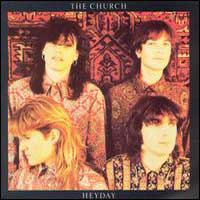 fast vergessen...
fast vergessen...
(31.10.2014)

 Mehr ...
Mehr ...
Whether it was the assistance of Peter Walsh on production, a decision to bear down and see what could be done, or some further combination of that and other factors, the Church came up with its best release since The Blurred Crusade with the powerful Heyday. Not changing anything in the basic Church sound but presenting both a brilliant slew of songs and some fantastic performances, the quartet created a flat-out fantastic record. The first side alone almost reads like a greatest-hits collection, with one highlight following hard on the other. "Myrrh," leading things off with a careful build up to the main part of the song much like "When You Were Mine," has a strange chorus that almost shouldn't work but does. It's only two lines long and sung in harmony by the full band, all while Willson-Piper and Koppes' guitars keep things moving. "Tristesse" begins with a playful guitar line before shifting into another mid-paced, just dreamy enough effort. "Already Yesterday," with a fine, low-key backing choir, the dramatic "Columbus" and the gentle, string-touched instrumental "Happy Hunting Ground" continue the mood, one lovely moment after another. The second side kicks off with a barnstormer, "Tantalized," easily the band's most aggressive and upfront song since its earliest days. With horns and bells adding to the rushed feel, Kilbey delivers quickly sung verses and staccato choruses, the music continuing to soar along as Willson-Piper and Koppes turn in brilliant guitar work. Add to that further horn and string orchestrations on songs like the wistful "Youth Worshipper" and "Night of Light," and Heyday is a total success.
(by Ned Raggett, AMG)
|
| Danny & Dusty: "The Lost Weekend" (A&M, Nov. 1985) |
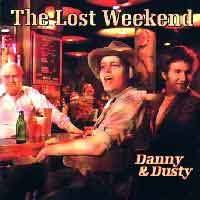 Dieses Album brachte Musiker von drei damals aufstrebenden L.A.-Gitarrenbands
für eine Wochenendsession zusammen, die natürlich keinesfalls
"verloren" war. Federführend waren die Sänger Dan
Stuart von Green On Red, der noch seinen
Keyboarder Chris Cacavas mitbrachte, und Steve Wynn von
Dream Syndicate, der seinen
Drummer Dennis Duck dabei hatte. Dazu kamen von den Long
Ryders die Gitarristen Sid Griffin und Stephen McCarthy
und der Bassist Tom Stevens. Bis auf Dylan's "Knocking On
Heaven's Door" gibt es nur neues eigenes Material von Stuart und
Wynn. Insgesamt eine gelungene Sache.
Dieses Album brachte Musiker von drei damals aufstrebenden L.A.-Gitarrenbands
für eine Wochenendsession zusammen, die natürlich keinesfalls
"verloren" war. Federführend waren die Sänger Dan
Stuart von Green On Red, der noch seinen
Keyboarder Chris Cacavas mitbrachte, und Steve Wynn von
Dream Syndicate, der seinen
Drummer Dennis Duck dabei hatte. Dazu kamen von den Long
Ryders die Gitarristen Sid Griffin und Stephen McCarthy
und der Bassist Tom Stevens. Bis auf Dylan's "Knocking On
Heaven's Door" gibt es nur neues eigenes Material von Stuart und
Wynn. Insgesamt eine gelungene Sache. |
| The Jazz Butcher and his Sikkorskis From Hell: "Hamburg" (Rebel/Glass, Nov. 1985) |
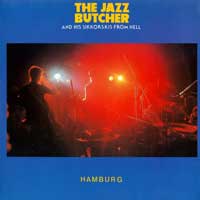 Der Engländer Pat Fish hat zwar einen ziemlich blutrünstigen
Künstlernamen, aber weder wird hier Jazz zermetzelt, noch Death
Metal von Hubschrauberpiloten gespielt, sondern ganz entspannter "Indie-Gitarren-Rock"
(oder wie auch immer man so was nennen soll!) live dargereicht. Ich
mag dieses Album aus der Hamburger Kultkneipe Onkel Pö nicht
nur wegen der gut rüber kommenden Publikumsstimmung sehr gerne,
sondern vor allem weil meine Lieblinx-Coverversion von Onkel Lous Sweet
Jane dabei ist!
Der Engländer Pat Fish hat zwar einen ziemlich blutrünstigen
Künstlernamen, aber weder wird hier Jazz zermetzelt, noch Death
Metal von Hubschrauberpiloten gespielt, sondern ganz entspannter "Indie-Gitarren-Rock"
(oder wie auch immer man so was nennen soll!) live dargereicht. Ich
mag dieses Album aus der Hamburger Kultkneipe Onkel Pö nicht
nur wegen der gut rüber kommenden Publikumsstimmung sehr gerne,
sondern vor allem weil meine Lieblinx-Coverversion von Onkel Lous Sweet
Jane dabei ist!
(07.04.2006)

 Mehr ...
Mehr ...
This live album, recorded (appropriately enough) in Hamburg, Germany in August 1985, features the post-David J. Butcher lineup of Pat Fish, Max Eider, Owen Jones, and Felix Ray. Given the Butcher's fondness for songs about alcohol, you might expect a drunken chaos; instead, Hamburg is an agreeably loose but thoroughly professional affair. Fish forgets no lyrics and Eider does not drop, smash, or otherwise abuse his guitar. One could quibble with the choice of material. The 12 songs here are heavy on the bittersweet, and any Butcher fan will be able to come up with a few favorites they'd like to have seen included; "Drink" and "J.B. v. P.M." leap most immediately to mind. Still, it's quite nice to have live versions of "Bath of Bacon," "Rain," "Real Men," "Sweet Jane" and so on, and Hamburg serves as a worthwhile document of the Butcher and his cohorts in their prime.
(by Bill Cassel, All Music Guide)
|
| The Jesus And Mary Chain: "Psychocandy" (WEA/Blanco Y Negro, Nov. 1985) |
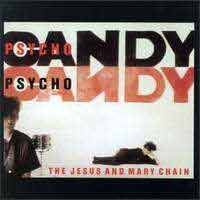 Debütalbum der schottischen Brüder Jim Reid und William Reid,
damals noch mit Bobby Gillespie am Schlagzeug, der später
als Sänger mit seiner eigenen Kapelle Primal Scream selber
bekannt wurde. Die Truppe hat mir damals bei ihrer Deutschland-TV-Premiere
eigentlich überhaupt nicht gefallen: monotoner Gesang, monotone
Rhythmen, monotoner Gitarrensound. Außerdem spielten sie, so weit
ich mich erinnern kann, mit dem Rücken zum (TV-) Publikum und machten
mit ihren Gitarren lieber kräftig Feedbacks. Das fand ich damals
ziemlich daneben, erst später konnte ich auf ihren Alben die Qualität
der Musik und ihres Songwritings erkennen und muss sagen: JAMC sind
sicherlich mit die besten Velvet Underground-Epigonen.
Wer meine Vorliebe zu Lou Reeds alter Kapelle kennt, weiß
das als Kompliment zu schätzen.
Debütalbum der schottischen Brüder Jim Reid und William Reid,
damals noch mit Bobby Gillespie am Schlagzeug, der später
als Sänger mit seiner eigenen Kapelle Primal Scream selber
bekannt wurde. Die Truppe hat mir damals bei ihrer Deutschland-TV-Premiere
eigentlich überhaupt nicht gefallen: monotoner Gesang, monotone
Rhythmen, monotoner Gitarrensound. Außerdem spielten sie, so weit
ich mich erinnern kann, mit dem Rücken zum (TV-) Publikum und machten
mit ihren Gitarren lieber kräftig Feedbacks. Das fand ich damals
ziemlich daneben, erst später konnte ich auf ihren Alben die Qualität
der Musik und ihres Songwritings erkennen und muss sagen: JAMC sind
sicherlich mit die besten Velvet Underground-Epigonen.
Wer meine Vorliebe zu Lou Reeds alter Kapelle kennt, weiß
das als Kompliment zu schätzen. |
| The Replacements:"Tim" (Sire, Nov. 1985) |
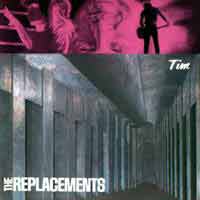 Grosse
Band - aber auch kommerziell absolut gescheitert. Vielleicht gerade
deshalb Kritikers Lieblinge? Egal, denn die Band um Sänger, Gitarristen
und Songschreiber Paul Westerberg war einfach das Beste im Bereich
zwischen Punkrock und den Rolling Stones. Grosse
Band - aber auch kommerziell absolut gescheitert. Vielleicht gerade
deshalb Kritikers Lieblinge? Egal, denn die Band um Sänger, Gitarristen
und Songschreiber Paul Westerberg war einfach das Beste im Bereich
zwischen Punkrock und den Rolling Stones. |
| The Apartments: "The Evening Visits ... And Stays For Years" (Rough Trade, 1985) |
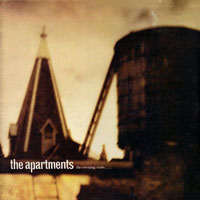 Gefunden in der Grabbelkiste.
Gefunden in der Grabbelkiste.
(08.04.2011)

 Mehr ...
Mehr ...
The Apartments' debut album The Evening Visits ... And Stays for Years is a gorgeous collection of folky jangle-pop spiked with country-rock and horn-laced pop. Frequently, the collection sounds under produced, but the songs themselves confirm that Peter Walsh, the brains behind the Apartments, is a graceful songwriter, capable of lovely melodies and affecting lyrics.
(by Stephen Thomas Erlewine, All Music Guide)
|
| Camper Van Beethoven: "Telephone Free Landslide Victory" (Rough Trade/Independent Project, 1985) |
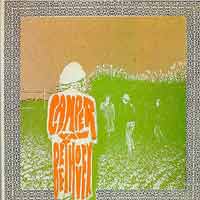 Das wunderbar schräge Debütalbum der legendären ersten
Band von David Lowery (Cracker),
das man schon alleine wegen "Take The Skinheads Bowling" lieben
muss ...
Das wunderbar schräge Debütalbum der legendären ersten
Band von David Lowery (Cracker),
das man schon alleine wegen "Take The Skinheads Bowling" lieben
muss ...
(03.12.2010)

 Mehr ...
Mehr ...
Mit ihrer bizarren Mischung aus Folk, Country, Ska, Tex-Mex, 60s Psychedelia und Rock'n'Roll gelten Camper Van Beethoven noch heute als eine der einflussreichsten Bands der Achtziger Jahre. Zusammen mit Bands wie den Replacements, H�sker D�, Minutemen, Sonic Youth oder den Meat Puppets strebten Camper Van Beethoven eine konsequente Neudefinition von Rock / Pop an. Ihre Strategie lautete: Vielfalt. Bewaffnet mit Violine, Mandoline und Bl�sern, einer eklektischen Offenheit f�r s�mtliche Musiken dieser Welt sowie einem bei�enden Sarkasmus setzten sie an, die g�ltigen Regeln und Codes von Coolness und Rock'n'Roll au�er Kraft zu setzen, ohne dabei zu vergessen, wie Rock sich anf�hlen sollte.
Das Debutalbum von Camper van Beethoven "Telephone Free Landslide Victory" erschien im Juni 1985. Das Album, das unter anderem den Camper-Klassiker "Take The Skinheads Bowling" und das Black Flag-Cover "Wasted" enth�lt, wurde ein richtiger Hit bei den College Radios, tauchte aber ebenso in den Top 10-Listen renommierter Musikkritiker auf.
They say "never say never," but it's still extremely unlikely something so goofily low-key, inventive, and fun will ever achieve cult status so quickly again, especially in terms of musical range on display. Not simply a rock group but not anything else, Camper Van Beethoven pulled off a series of entertaining fusions throughout its debut record, as the opening song "Border Ska" indicates by name alone. Eastern European folk, tropical grooves, post-punk atmospherics, country laid-back good times, psych/garage band aesthetics, lyrics about Mao, Greece, and more � a lot of stuff went into the Santa Cruz band's brew, and most of it came up trumps on Telephone. Lowery's lead vocals aren't much like what his more famous work in Cracker would indicate, being more speak-singing through shaggy dog stories (even one about Lassie) of all stripes. Hearing his tale of woe on "Wasted" � "I was a punker, and I had a Mohawk/I was so gnarly and I drove my dad's car" � delivered in a "yeah dude" tone of voice is pretty darn funny. Segel's keyboards and violins color the arrangements with a fun touch, while rhythm team Krummenacher and then recently departed drummer Anthony Guess try out nearly everything at least once. The production is eminently suited for the proceedings, sounding a bit like the thick, fuzzy flow of many Shimmy-Disc releases but with just enough of a crisp edge. When it comes to humor, it's everywhere � for instance, the plaintively sung chorus of "Where the Hell Is Bill?," not to mention the various speculative answers ("Maybe he went to get a Vespa scooter"). Or, of course, the song that kick-started the band's reputation, "Take the Skinheads Bowling," two and a half minutes of chiming, goofy nonsense with references to Jah and incomplete rhymes.
(by Ned Raggett, All Music Guide)
|
| The Blasters: "Hard Line" (Warner/Slash, 1985) |
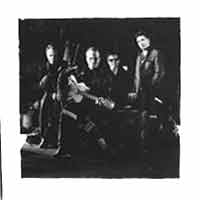 Die
Blasters waren eine interessante Truppe, denn sie schafften überzeugend
den Spagat zwischen traditionellem Rockabilly-Publikum auf der einen
Seite und eher "alternativ" angehauchtem Rockpublikum auf
der anderen Seite. Vielleicht könnte man sie auch als die erste
"Americana"-Band bezeichnen. Seit den frühen 80ern aktiv
sollen sie angeblich viele der L.A.-Undergroundbands auf den Country-
und Blues-Geschmack gebracht haben (z.B. Jeffrey
Lee Pierce vom Gun Club oder
John Doe von der Band "X". Im Mittelpunkt standen die
Brüder Phil Alvin (Sänger) und Dave Alvin (Gitarrist
und Songschreiber). "Hard Line" war das erste Album, mit dem
sie in Europa bekannter wurden (Sommer 85 waren sie beim Loreley-Rockpalast
dabei), leider aber auch ihr letztes Album. Die
Blasters waren eine interessante Truppe, denn sie schafften überzeugend
den Spagat zwischen traditionellem Rockabilly-Publikum auf der einen
Seite und eher "alternativ" angehauchtem Rockpublikum auf
der anderen Seite. Vielleicht könnte man sie auch als die erste
"Americana"-Band bezeichnen. Seit den frühen 80ern aktiv
sollen sie angeblich viele der L.A.-Undergroundbands auf den Country-
und Blues-Geschmack gebracht haben (z.B. Jeffrey
Lee Pierce vom Gun Club oder
John Doe von der Band "X". Im Mittelpunkt standen die
Brüder Phil Alvin (Sänger) und Dave Alvin (Gitarrist
und Songschreiber). "Hard Line" war das erste Album, mit dem
sie in Europa bekannter wurden (Sommer 85 waren sie beim Loreley-Rockpalast
dabei), leider aber auch ihr letztes Album. |
| Makin' Time: "Up On The Sun" (Stiff, 1985) |
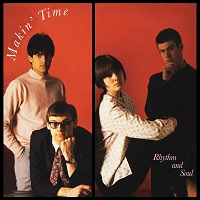

 Mehr ...
Mehr ...
Die britische Mood-Band Makin' Time haben sich 1984 gegründet. An der Spitze der Band standen die kraftvollen Stimmen der Orgelspielerin Fay Hallam und die des Gitarristen und Sängers Mark McGounden, die zusammen mit ihrem Bassisten und späteren Charlatans Gründer Martin Blunt eine herrliche Mischung aus Power-Pop und 1960er Pop und Soul bilden.
|
| Meat Puppets: "Up On The Sun" (SST, 1985) |
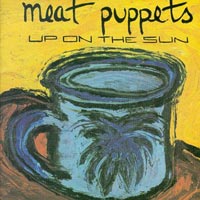 Das dritte Album des Trios - und bereits ihr zweites beim Kultlabel
SST. Der Vorgänger "Meat Puppets II" von 1984
gilt vielen als Meisterwerk im Grenzbereich Hard Core/Country, zwei
Gegenden, von denen man bislang gar nicht wusste, dass sie aneinander
grenzen, aber für mich ist die Band eigentlich erst ab diesem Album
hörbar: es gibt hier weniger Hardcore (für den ich als Hörer
doch etwas zu alt bin), mehr Pop (d.h. vor allem: bessere Melodien)
und Curt Kirkwood singt inzwischen besser, auch wenn er manchmal
immer noch leicht schräg daneben liegt. Wirlich Liebgewonnen hatte
ich die Band erst mit dem fünften Album "Huevos"
von 1987.
Das dritte Album des Trios - und bereits ihr zweites beim Kultlabel
SST. Der Vorgänger "Meat Puppets II" von 1984
gilt vielen als Meisterwerk im Grenzbereich Hard Core/Country, zwei
Gegenden, von denen man bislang gar nicht wusste, dass sie aneinander
grenzen, aber für mich ist die Band eigentlich erst ab diesem Album
hörbar: es gibt hier weniger Hardcore (für den ich als Hörer
doch etwas zu alt bin), mehr Pop (d.h. vor allem: bessere Melodien)
und Curt Kirkwood singt inzwischen besser, auch wenn er manchmal
immer noch leicht schräg daneben liegt. Wirlich Liebgewonnen hatte
ich die Band erst mit dem fünften Album "Huevos"
von 1987.
(17.06.2008)

 Mehr ...
Mehr ...
|
What does a band do when they're trying to follow-up a masterpiece? Release another masterpiece, of course. That's exactly what the Meat Puppets did with 1985's Up on the Sun. Issued one year after Meat Puppets II, the songwriting had become more focused, the performances were tighter, and Curt Kirkwood's vocals had progressed from a high-pitched warbling to a soothing monotone. Up on the Sun catches the Arizona trio in a relaxed mood, for the most part; the tunes aren't wound up as tightly as its predecessor, with the album-opening title track, the instrumental "Seal Whales," and "Hot Pink" being fine examples. Other highlights include "Maiden's Milk," which contains some great instrumental interplay between the bandmembers, as well as the upbeat "Away," the funky "Buckethead," the psychedelic "Two Rivers," and the furious "Enchanted Porkfist." As with the other 1999 Meat Puppets reissues on Rykodisc, rarities and demos are included as bonus tracks, including a haunting demo of the album's title track.
(by Greg Prato, All Music Guide)
|
|
| Jeffrey Lee Pierce: "Wildweed" (Statik, 1985) |
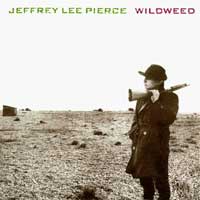 Eine der ersten "Independent" bzw. "alternative"
Platten, die ich mir damals gekauft habe. Den gerade frisch aufgelösten
Gun Club kannte ich damals noch
gar nicht, habe ihn quasi nach diesem einzigen Soloalbum des Vorsitzenden
vom Pistolenclub kennen- und schätzen gelernt.
Eine der ersten "Independent" bzw. "alternative"
Platten, die ich mir damals gekauft habe. Den gerade frisch aufgelösten
Gun Club kannte ich damals noch
gar nicht, habe ihn quasi nach diesem einzigen Soloalbum des Vorsitzenden
vom Pistolenclub kennen- und schätzen gelernt.
Aufgefallen war mir zuerst das - zugegebenermaßen - etwas brutale
und traurige, aber irgendwie doch wunderschöne Cover, welches perfekt
zur Musik passt. Am Bass ist kurioserweise John McKenzie zu hören,
den ich aus seiner Zeit mit Man kannte.
Allerdings hat die Musik hier wenig mit der meiner Waliser Lieblingsrockern
zu tun. Ich mag übrigenz beides sehr!

 Mehr ...
Mehr ...
|
In July 1996, Tom Engelshoven of Dutch music magazine Oor described Jeffrey
Lee Pierce as the missing link between the Eagles and Kurt Cobain. Four
months after the Gun Club frontman had passed away, the article labeled
him as the true victim of what Engelshoven interpreted as "the American
disease." Among the symptoms were a strong identification with violence
and death and a clear notion of American society being imbued with it.
Pierce's lyrics testified of his awareness of America's earliest history,
a nation established at the barrel of a gun. Obsessed with an inevitable
apocalyptic destiny, he took his lowlife background as an explanation
for a feverish longing for decay. Sex, booze, and drugs all claimed their
share in a self-destructive lifestyle, culminating in an early death at
the age of 37. Wildweed was the first of two solo albums Pierce made in
between his Gun Club albums. Following in the footsteps of remarkable
statements like Miami and The Las Vegas Story, the material presented
here isn't all that different. The violence theme practically drips from
the album cover, depicting Pierce with a dreamy look and a shotgun slung
over his shoulder. Standing amidst what could be the last true vestige
of an unspoiled, rural America, it's a fair bet that he's ready to shoot
anything even slightly disturbing -- upon which he probably will utter
one final howl before putting himself "to rest" as well. Plenty
of those howls are scattered through Wildweed, which opens with a strong
threesome of "Love and Desperation," "Sex Killer,"
and "Cleopatra Dreams On." In more than one way, "Love
and Desperation" is the twin to The Fire of Love's "Sex Beat."
Apart from the infectious driving beat, one only has to compare the lyrics
of the latter ("I, I know your reasons/And I, I know your goals/We
can f*ck forever/But you will never get my soul") to the former ("Somebody
hurts you, so you hurt me/So I hurt somebody else, who I have never seen/Who
hurts somebody else, why on down the road/Who hurts somebody else who
goes on home/With you") to conclude that Pierce's world is one in
which love takes a wrong turn most of the time. Halfway through the album
things get a little awkward when, during the nursery rhyme of "Hey
Juana," Pierce starts name-checking a colleague ("Now Nick the
Cave/He spent all his pay/On a bottle of gin/And a shark without a fin").
Luckily, "The Midnight Promise" makes a beautiful closing piece.
Alas, the CD release of Wildweed adds some extra tracks that appeared
on the Love and Desperation 12" instead of the more intriguing experiments
with spoken word from the 7" bonus that came with the album or the
free jazz of the title track of the Flamingo EP.
(by Quint Kik, All
Music Guide)
|
|
| This Mortal Coil: "It'll End In Tears" (4AD, 1985) |
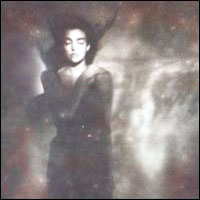 Dies ist die erste von drei CDs dieses Projekts von Ivo Watt-Russell
und John Fryer, den Betreibern bzw. Stammproduzenten des 4AD-Labels
aus England. Zu hören sind eigene verschrobene bzw. verhuschte
Instrumentalstücke, fast eher Klangflächen, sowie einige sehr
geschmackvolle Coverversionen. Der Gesang und wichtige Instrumentalbeiträge
stammen von den Künstlern des Labels: Cocteau Twins (Elizabeth
Fraser, Simon Raymonde und Robin Guthrie), Dead Can Dance (Lisa
Gerard und Brendan Perry) und andere. Unter den Coversongs ist besonders
Tim Buckleys "Song To The Siren", gesungen von Elizabeth
Fraser, hervorzuheben, das es als Single 1983 sogar bis in die englischen
Singlecharts schaffte (somit Tim Buckleys einziger Chartserfolg).
Dies ist die erste von drei CDs dieses Projekts von Ivo Watt-Russell
und John Fryer, den Betreibern bzw. Stammproduzenten des 4AD-Labels
aus England. Zu hören sind eigene verschrobene bzw. verhuschte
Instrumentalstücke, fast eher Klangflächen, sowie einige sehr
geschmackvolle Coverversionen. Der Gesang und wichtige Instrumentalbeiträge
stammen von den Künstlern des Labels: Cocteau Twins (Elizabeth
Fraser, Simon Raymonde und Robin Guthrie), Dead Can Dance (Lisa
Gerard und Brendan Perry) und andere. Unter den Coversongs ist besonders
Tim Buckleys "Song To The Siren", gesungen von Elizabeth
Fraser, hervorzuheben, das es als Single 1983 sogar bis in die englischen
Singlecharts schaffte (somit Tim Buckleys einziger Chartserfolg).

 Mehr ...
Mehr ...
|
The first of 4AD owner Ivo Watts-Russell's multi-artist studio sessions
under the This Mortal Coil name, 1984's It'll End in Tears was a surprisingly
influential album in many circles, key in the reawakening of interest
in artists like Alex Chilton and the late Tim Buckley by a younger generation
of listeners. (Two songs from Big Star's Third are included, a version
of "Kangaroo" featuring Cindytalk vocalist Gordon Sharp that
sounds even druggier and more disorienting than the original, and a chilling
piano and strings version of "Holocaust" with haunted vocals
by Howard Devoto; the simple but ravishing version of Buckley's "Song
to the Siren" by Cocteau Twins Liz Fraser and Robin Guthrie was cited
by David Lynch as the direct inspiration for Julee Cruise's first two
albums and has since been used several times in commercials and films.)
The covers are the most memorable part of the album -- a Robbie Grey-sung
version of Colin Newman's "Not Me," cleverly incorporating a
hypnotic riff from another Newman song, "B," is the most conventionally
hooky song on the album, to the point that folks who haven't listened
to the album for a while tend to forget that half of the songs are "band"
originals. These six songs mark 4AD's definitive break from its origins
as an artsy post-punk imprint (Bauhaus, Modern English's first few records,
etc.) to the development of "the 4AD sound," a heavily reverbed
wash of treated guitars and atmospheric keyboards with vocals treated
as another instrument in an amorphous wash of sound. The problem is that
these largely instrumental tracks sound more like half-baked studio doodles
than fully formed songs; a three-song stretch on side two featuring Dead
Can Dance's Lisa Gerrard is particularly tiresome. As a whole, It'll End
in Tears is a lovely, often exquisite record; taken individually, the
power of some of the songs is lost.
(by Stewart Mason, AMG)
|
|
 weitere Highlights ...
weitere Highlights ...  Dieses
Seitenprojekt der Musiker John Doe (v, bg), Exene Cervenka
(v) und D.J. Bonebrake (dr) von der Band "X", unterstützt
vom Blasters-Gitarristen Dave Alvin brachte
zum ersten mal Countrymusik, gespielt von "Punkrockern" (i.w.S.)
auf die Bühne. Damals zwar kein großer kommerzieller Erfolg,
beruft sich heute ein großer Teil der "Americana" /
"No Depression"-Szene auf diese Band als einen der wichtigsten
Einflüsse. Vielleicht passt in gewisser Weise der Vergleich mit
den Velvet Underground: die fanden zu ihrer aktiven
Zeit (1965-70) auch nicht viele Plattenkäufer, aber jeder der es
tat, gründete danach eine Band.
Dieses
Seitenprojekt der Musiker John Doe (v, bg), Exene Cervenka
(v) und D.J. Bonebrake (dr) von der Band "X", unterstützt
vom Blasters-Gitarristen Dave Alvin brachte
zum ersten mal Countrymusik, gespielt von "Punkrockern" (i.w.S.)
auf die Bühne. Damals zwar kein großer kommerzieller Erfolg,
beruft sich heute ein großer Teil der "Americana" /
"No Depression"-Szene auf diese Band als einen der wichtigsten
Einflüsse. Vielleicht passt in gewisser Weise der Vergleich mit
den Velvet Underground: die fanden zu ihrer aktiven
Zeit (1965-70) auch nicht viele Plattenkäufer, aber jeder der es
tat, gründete danach eine Band. Eine
ungewöhnliche Platte von Emmylou. Nach einigen eher schwächeren
Alben mit Ausflügen in den Mainstream (z.B. das furchtbare "White
Shoes" von 1983) stimmte wieder die musikalisch Qualität (Albert
Lee war seit der 81er-Platte "Evangeline" zum ersten mal
wieder dabei) und erstmalig gab's fast ausschließlich eigenes
Material, von Emmylou zusammen mit ihrem damaligen musikalischen und
Lebenspartner Paul Kennerley verfasst.
Eine
ungewöhnliche Platte von Emmylou. Nach einigen eher schwächeren
Alben mit Ausflügen in den Mainstream (z.B. das furchtbare "White
Shoes" von 1983) stimmte wieder die musikalisch Qualität (Albert
Lee war seit der 81er-Platte "Evangeline" zum ersten mal
wieder dabei) und erstmalig gab's fast ausschließlich eigenes
Material, von Emmylou zusammen mit ihrem damaligen musikalischen und
Lebenspartner Paul Kennerley verfasst. Das
war Liebe auf den zweiten Blick.: Ich kannte die Band nur von einem
Rockpalastkonzert aus einem Hamburger Club, das mich kaum beeindruckt
hatte. Ich konnte mich nur noch daran erinnern, dass Sänger die
ganze Zeit mit weißen Gladiolen (oder Tulpen?) rumhantiert hatte.
Als ich diese Platte (ihre dritte, wenn man Single/Maxi-Kompilation
"Hateful Of Hollow" mitzählt) dann in einem Sonderangebotsständer
fand, entschloss ich mich nach langen zögern zum Kauf - den ich
bis heute nicht bereut habe. Sänger/Texter Morrissey und
Gitarrist/Komponist Johnny Marr überzeugen mit ihren Liedern
und mit ihrem einzigartigen Sound. Mal wieder einer der wenigen Fälle,
wo mein Geschmack und der Massengeschmack "gewisse Berührungspunkte"
haben.
Das
war Liebe auf den zweiten Blick.: Ich kannte die Band nur von einem
Rockpalastkonzert aus einem Hamburger Club, das mich kaum beeindruckt
hatte. Ich konnte mich nur noch daran erinnern, dass Sänger die
ganze Zeit mit weißen Gladiolen (oder Tulpen?) rumhantiert hatte.
Als ich diese Platte (ihre dritte, wenn man Single/Maxi-Kompilation
"Hateful Of Hollow" mitzählt) dann in einem Sonderangebotsständer
fand, entschloss ich mich nach langen zögern zum Kauf - den ich
bis heute nicht bereut habe. Sänger/Texter Morrissey und
Gitarrist/Komponist Johnny Marr überzeugen mit ihren Liedern
und mit ihrem einzigartigen Sound. Mal wieder einer der wenigen Fälle,
wo mein Geschmack und der Massengeschmack "gewisse Berührungspunkte"
haben. Ein mir aus unerklärlichen Gründen von der Kritik nicht sonderlich
geschätztes Album vom besten britischen Singer/Songwriter/Guitarplayer
(in dieser Kombination unerreicht: es gibt wahrscheinlich bessere Sänger,
vielleicht bessere Songschreiber, aber kaum bessere Gitarristen mit
einem eigenen, unverwechselbaren Ton!). Die Platte enthält mit
dem Eröffnungslied "When The Spell is Broken" eines meiner
Lieblinx-Thompson-Lieder mit dem wunderbaren Wechselgesang von Thompson
und dem Folkrockpaar Clive Gregson/Christine Collister.
Und den Abschluss bildet in bester "Night Comes In" Tradition
(d.h. u.a.: ein beeindruckendes Gitarrensolo) "Love in a faithless
country" mit dem etwas merkwürdigen Chor der "Soultanas".
Ein mir aus unerklärlichen Gründen von der Kritik nicht sonderlich
geschätztes Album vom besten britischen Singer/Songwriter/Guitarplayer
(in dieser Kombination unerreicht: es gibt wahrscheinlich bessere Sänger,
vielleicht bessere Songschreiber, aber kaum bessere Gitarristen mit
einem eigenen, unverwechselbaren Ton!). Die Platte enthält mit
dem Eröffnungslied "When The Spell is Broken" eines meiner
Lieblinx-Thompson-Lieder mit dem wunderbaren Wechselgesang von Thompson
und dem Folkrockpaar Clive Gregson/Christine Collister.
Und den Abschluss bildet in bester "Night Comes In" Tradition
(d.h. u.a.: ein beeindruckendes Gitarrensolo) "Love in a faithless
country" mit dem etwas merkwürdigen Chor der "Soultanas". Resteverwertung? Leichenfledderei? Irgendwie schon, aber trotzdem eine
tolle Platte - zumindest für die Lou Reed/Velvet Underground-Fans!
Nach drei phantastischen Alben für Verve/MGM 1967-69 ("The
Velvet Underground & Nico", "White Light/White Heat"
und "The Velvet Underground")
wurde der Band vor Fertigstellung eines vierten Albums der Plattenvertrag
gekündigt. Danach ging es dann mit dem "echten" vierten
Album "Loaded" bei Atlantic
weiter. Bei den Vorbereitungen zur Wiederveröffentlichung der ersten
drei Alben wurden dann die Bänder mit den hier versammelten Liedern
"entdeckt", wobei ich mich frage, wieso man so was erst "entdecken"
muss, statt es direkt vernünftig zu archivieren!
Resteverwertung? Leichenfledderei? Irgendwie schon, aber trotzdem eine
tolle Platte - zumindest für die Lou Reed/Velvet Underground-Fans!
Nach drei phantastischen Alben für Verve/MGM 1967-69 ("The
Velvet Underground & Nico", "White Light/White Heat"
und "The Velvet Underground")
wurde der Band vor Fertigstellung eines vierten Albums der Plattenvertrag
gekündigt. Danach ging es dann mit dem "echten" vierten
Album "Loaded" bei Atlantic
weiter. Bei den Vorbereitungen zur Wiederveröffentlichung der ersten
drei Alben wurden dann die Bänder mit den hier versammelten Liedern
"entdeckt", wobei ich mich frage, wieso man so was erst "entdecken"
muss, statt es direkt vernünftig zu archivieren!  Mehr ...
Mehr ...
 Sie fielen mir als Vorgruppe von Lloyd Cole bei einem Konzert in
der Bochumer Zeche angenehm auf. Das Debüt der schottischen Band
um den Sänger und Bassisten Justin Currie und den Gitarristen
Ian Harvie blieb damals bei uns aber relativ unbeachtet und es
war schwierig, die Platte aufzutreiben. Erst vier Jahre später
(und mit neuem Plattenvertrag) kam mit der Single "Nothing Ever
Happens" aus dem Album "The
Waking Hour" der grosse Durchbruch.
Sie fielen mir als Vorgruppe von Lloyd Cole bei einem Konzert in
der Bochumer Zeche angenehm auf. Das Debüt der schottischen Band
um den Sänger und Bassisten Justin Currie und den Gitarristen
Ian Harvie blieb damals bei uns aber relativ unbeachtet und es
war schwierig, die Platte aufzutreiben. Erst vier Jahre später
(und mit neuem Plattenvertrag) kam mit der Single "Nothing Ever
Happens" aus dem Album "The
Waking Hour" der grosse Durchbruch. Eines von vielen guten Alben der Band um den Sänger Dan Stuart und den Keyboarder Chris Cacavas.
Eines von vielen guten Alben der Band um den Sänger Dan Stuart und den Keyboarder Chris Cacavas.
 Mehr ...
Mehr ...
 Ein geniales Debüt der damals knapp 20jährigen Maria McKee
mit ihrer "Begleitband" (Ryan Hedgecock an der Gitarre,
Marvin Etzioni am Bass und Don Heffington am Schlagzeug).
Ich habe damals ein paar Lieder von ihrem mittäglichen Auftritt
beim "Rock am Ring" auf Video mitgeschnitten, bei dem Maria
in ihrem bäuerlichen Schlabberkleid einfach hinreißend aussah
und wie eine junge Göttin sang. Zwar schrieb sie auch damals schon
gute eigene Songs ("Sweet Sweet Baby" zusammen mit Little
Steven und "Wait 'til We Get Home" mit Gitarrist Hedgecock),
herausragend ist aber "Ways To be Wicked", das Tom Petty
für sie verfasste und "Don't Toss Us Away" von ihrem
Stiefbruder Bryan McLean, der mal in den 60ern bei der Band Love
war. Bassist Etzioni zeigt auch durch drei Songs seine Songwriterqualitäten:
so stammt von ihm der geniale Rocker "East Of Eden".
Ein geniales Debüt der damals knapp 20jährigen Maria McKee
mit ihrer "Begleitband" (Ryan Hedgecock an der Gitarre,
Marvin Etzioni am Bass und Don Heffington am Schlagzeug).
Ich habe damals ein paar Lieder von ihrem mittäglichen Auftritt
beim "Rock am Ring" auf Video mitgeschnitten, bei dem Maria
in ihrem bäuerlichen Schlabberkleid einfach hinreißend aussah
und wie eine junge Göttin sang. Zwar schrieb sie auch damals schon
gute eigene Songs ("Sweet Sweet Baby" zusammen mit Little
Steven und "Wait 'til We Get Home" mit Gitarrist Hedgecock),
herausragend ist aber "Ways To be Wicked", das Tom Petty
für sie verfasste und "Don't Toss Us Away" von ihrem
Stiefbruder Bryan McLean, der mal in den 60ern bei der Band Love
war. Bassist Etzioni zeigt auch durch drei Songs seine Songwriterqualitäten:
so stammt von ihm der geniale Rocker "East Of Eden".
 Mehr ...
Mehr ...
 Dieses Gitarrentrio war damals eine Offenbarung. Sänger und Gitarrist
J. Mascis, Bassist Lou Barlow (später mit The
Folk Implosion bekannt geworden) und Drummer Murph spielten
ihre Mischung aus Punk und Metal, die viele Leute später "Grunge"
nannten. Ich besitze das seltene Original-Vinyl von Homestead, noch
ohne den Zusatz "Jr.", den die Band später führen
musste, da sie von der San Francisco-Hippie-Band "The Dinosaurs"
verklagt wurden, was mir insofern ein bisschen peinlich ist, als in
dieser "Altherrenband" ein paar Leute mehr oder weniger erfolgreich
spielten, die eigentlich zu meinen alten Helden gehören: Robert
Hunter (Grateful Dead-Texter),
John Cipollina (Quicksilver Messenger
Service), Merl Saunders (Jerry
Garcia-Keyboarder) und Barry Melton (County Joe & The
Fish-Gitarrist und heutzutage Rechtsanwalt - war das wohl seine Idee?).
Dieses Gitarrentrio war damals eine Offenbarung. Sänger und Gitarrist
J. Mascis, Bassist Lou Barlow (später mit The
Folk Implosion bekannt geworden) und Drummer Murph spielten
ihre Mischung aus Punk und Metal, die viele Leute später "Grunge"
nannten. Ich besitze das seltene Original-Vinyl von Homestead, noch
ohne den Zusatz "Jr.", den die Band später führen
musste, da sie von der San Francisco-Hippie-Band "The Dinosaurs"
verklagt wurden, was mir insofern ein bisschen peinlich ist, als in
dieser "Altherrenband" ein paar Leute mehr oder weniger erfolgreich
spielten, die eigentlich zu meinen alten Helden gehören: Robert
Hunter (Grateful Dead-Texter),
John Cipollina (Quicksilver Messenger
Service), Merl Saunders (Jerry
Garcia-Keyboarder) und Barry Melton (County Joe & The
Fish-Gitarrist und heutzutage Rechtsanwalt - war das wohl seine Idee?). Mitten in den ungemütlichen 80ern debütiert diese New Yorker Sängerin/Songschreiberin
mit einem Hitalbum! "Marlene On The Wall" war damals ein Ohrwurm,
dem man sich nicht entziehen konnte. Ihre bekanntesten Songs, "Luka"
und "Tom's Diner" findet man aber erst auf dem Nachfolger
"Solitude Standing"
von 1987. Als Produzent neben Steve Addabo ist ein alter Bekannter
dabei: Lenny Kaye von der Patti
Smith Group.
Mitten in den ungemütlichen 80ern debütiert diese New Yorker Sängerin/Songschreiberin
mit einem Hitalbum! "Marlene On The Wall" war damals ein Ohrwurm,
dem man sich nicht entziehen konnte. Ihre bekanntesten Songs, "Luka"
und "Tom's Diner" findet man aber erst auf dem Nachfolger
"Solitude Standing"
von 1987. Als Produzent neben Steve Addabo ist ein alter Bekannter
dabei: Lenny Kaye von der Patti
Smith Group. Das frühe Meisterwerk der englischen Sänger/Gitarristen Nikki
Sudden und Dave Kusworth, begleitet von Nikkis Bruder Epic
Soundtrack am Schlagzeug und Mark Lemon am Bass.
Das frühe Meisterwerk der englischen Sänger/Gitarristen Nikki
Sudden und Dave Kusworth, begleitet von Nikkis Bruder Epic
Soundtrack am Schlagzeug und Mark Lemon am Bass. Michael
Stipe, Peter Buck, Mike Mills und Bill Berry
auf dem Weg zum Weltruhm, dort aber noch nicht ganz angekommen. Dieses
letzte Album vor der ersten richtigen Hitsingle "The One I Love",
produziert von Joe Boyd (Fairport
Convention, Incredible String Band,
etc.), gilt für viele als Fehlschlag, obwohl es für mich der
erste Zugang zur Band war. Ich liebe das Album trotz aller negativen
Kritiken heiß und innig.
Michael
Stipe, Peter Buck, Mike Mills und Bill Berry
auf dem Weg zum Weltruhm, dort aber noch nicht ganz angekommen. Dieses
letzte Album vor der ersten richtigen Hitsingle "The One I Love",
produziert von Joe Boyd (Fairport
Convention, Incredible String Band,
etc.), gilt für viele als Fehlschlag, obwohl es für mich der
erste Zugang zur Band war. Ich liebe das Album trotz aller negativen
Kritiken heiß und innig. Das dritte Album von Mike Scott, zusammen mit seinen Mitstreitern
Karl Wallinger und Anthony Thistlethwaite, ist das beste
dieser "Band" (eigentlich war das ja immer eher Scotts Soloprojekt).
Die Single "Whole Of The Moon" ist absolut genial!
Das dritte Album von Mike Scott, zusammen mit seinen Mitstreitern
Karl Wallinger und Anthony Thistlethwaite, ist das beste
dieser "Band" (eigentlich war das ja immer eher Scotts Soloprojekt).
Die Single "Whole Of The Moon" ist absolut genial!
 Mehr ...
Mehr ...
 Die Mädels habe ich seit ihrem Auftritt Frühjahr 1986 in der Zeche
Bochum - noch vor einem überschaubar großen Publikum - in
mein Herz geschlossen. Fünf Meter vor Susanna Hoffs habe
ich gesessen und war sprachlos. Im Laufe des Sommers wurde die Platte,
vor allem der Prince-Titel "Manic Monday", dann zum
Dauerbrenner und nutzte dabei leider ein wenig ab. Die beiden folgenden
Alben habe ich dann nicht mehr so richtig zur Kenntnis genommen, aber
"Different Light" bleibt wichtig, u.a. weil es auch von den
anderen drei Ladies (Gitarristin Vicki Peterson, später
bei den Continental Drifters;
ihrer trommelnden Schwester Debbie Peterson und Bassistin Michael
Steele) tolle kompositorische und gesangliche Beiträge gab.
Anerkennung gehört ihnen u. a. weil sie mit "September Gurls"
von Alex Chilton eines meiner absoluten Lieblingslieder aufgenommen
haben.
Die Mädels habe ich seit ihrem Auftritt Frühjahr 1986 in der Zeche
Bochum - noch vor einem überschaubar großen Publikum - in
mein Herz geschlossen. Fünf Meter vor Susanna Hoffs habe
ich gesessen und war sprachlos. Im Laufe des Sommers wurde die Platte,
vor allem der Prince-Titel "Manic Monday", dann zum
Dauerbrenner und nutzte dabei leider ein wenig ab. Die beiden folgenden
Alben habe ich dann nicht mehr so richtig zur Kenntnis genommen, aber
"Different Light" bleibt wichtig, u.a. weil es auch von den
anderen drei Ladies (Gitarristin Vicki Peterson, später
bei den Continental Drifters;
ihrer trommelnden Schwester Debbie Peterson und Bassistin Michael
Steele) tolle kompositorische und gesangliche Beiträge gab.
Anerkennung gehört ihnen u. a. weil sie mit "September Gurls"
von Alex Chilton eines meiner absoluten Lieblingslieder aufgenommen
haben.  Die Ryders waren eine typische Band des L.A.-Psychedelic-Rockszene aus den
frühen 80ern (Blasters, Green
On Red, Dream Syndicate,
etc.) mit starken Wurzeln in der Countrymusik und natürlich, wie
schon im Bandnamen deutlich wird, mit Byrds-Bezügen. Dieses
Album wurde in London von Will Birch, dem ehemaligen Drummer
der Kursaal Flyers produziert.
Die Ryders waren eine typische Band des L.A.-Psychedelic-Rockszene aus den
frühen 80ern (Blasters, Green
On Red, Dream Syndicate,
etc.) mit starken Wurzeln in der Countrymusik und natürlich, wie
schon im Bandnamen deutlich wird, mit Byrds-Bezügen. Dieses
Album wurde in London von Will Birch, dem ehemaligen Drummer
der Kursaal Flyers produziert. Durch den Gitarristen John Thoman war die Band aus L.A. wieder
zum Quintett angewachsen und hatte genauso wie ihre lokale "Konkurrenz"
von den Long Ryders bei Island einen Majorvertrag
unterzeichnet, aber leider war nach diesem schönen Album Schluss
mit der Band. Bassist Steve Roback, Keyboarder Will Glenn
und Gitarren-Neuzugang Thoman gründeten anschließend
die ebenso guten und ebenfalls wenig erfolgreichen Viva Saturn,
die ich mir eigentlich auch mal wieder anhören müsste. Sänger/Gitarrist
Matt Piucci vertrat danach Frank Sampedro auf dem merkwürdigen
Crazy-Horse-ohne-Neil-Young-Album "Left For Dead",
während jener mit Neil Youngs "Freedom"
zu tun hatte.
Durch den Gitarristen John Thoman war die Band aus L.A. wieder
zum Quintett angewachsen und hatte genauso wie ihre lokale "Konkurrenz"
von den Long Ryders bei Island einen Majorvertrag
unterzeichnet, aber leider war nach diesem schönen Album Schluss
mit der Band. Bassist Steve Roback, Keyboarder Will Glenn
und Gitarren-Neuzugang Thoman gründeten anschließend
die ebenso guten und ebenfalls wenig erfolgreichen Viva Saturn,
die ich mir eigentlich auch mal wieder anhören müsste. Sänger/Gitarrist
Matt Piucci vertrat danach Frank Sampedro auf dem merkwürdigen
Crazy-Horse-ohne-Neil-Young-Album "Left For Dead",
während jener mit Neil Youngs "Freedom"
zu tun hatte. Mehr ...
Mehr ...
 Nach "Swordfishtrombones"
hält Waits locker den selbst gesetzten Standard, auch wenn das
alles natürlich nicht mehr ganz so überraschend daher kommt,
wie zwei Jahre zuvor!
Nach "Swordfishtrombones"
hält Waits locker den selbst gesetzten Standard, auch wenn das
alles natürlich nicht mehr ganz so überraschend daher kommt,
wie zwei Jahre zuvor!
 Mehr ...
Mehr ...
 Das zweite Album der Band um die Sängerin Natalie Merchant,
nach dem Debüt beim Bonner Normal-Label jetzt bei Elektra, einer
renommierten großen Firma. Diese Art von "Aufstieg"
führt ja bei vielen Bands zu unbefriedigenden Ergebnissen - hier
aber blüht die Band richtig auf, was nicht zuletzt ein Verdienst
des Produzenten Joe Boyd ist.
Das zweite Album der Band um die Sängerin Natalie Merchant,
nach dem Debüt beim Bonner Normal-Label jetzt bei Elektra, einer
renommierten großen Firma. Diese Art von "Aufstieg"
führt ja bei vielen Bands zu unbefriedigenden Ergebnissen - hier
aber blüht die Band richtig auf, was nicht zuletzt ein Verdienst
des Produzenten Joe Boyd ist.  fast vergessen...
fast vergessen... Mehr ...
Mehr ...
 Dieses Album brachte Musiker von drei damals aufstrebenden L.A.-Gitarrenbands
für eine Wochenendsession zusammen, die natürlich keinesfalls
"verloren" war. Federführend waren die Sänger Dan
Stuart von Green On Red, der noch seinen
Keyboarder Chris Cacavas mitbrachte, und Steve Wynn von
Dream Syndicate, der seinen
Drummer Dennis Duck dabei hatte. Dazu kamen von den Long
Ryders die Gitarristen Sid Griffin und Stephen McCarthy
und der Bassist Tom Stevens. Bis auf Dylan's "Knocking On
Heaven's Door" gibt es nur neues eigenes Material von Stuart und
Wynn. Insgesamt eine gelungene Sache.
Dieses Album brachte Musiker von drei damals aufstrebenden L.A.-Gitarrenbands
für eine Wochenendsession zusammen, die natürlich keinesfalls
"verloren" war. Federführend waren die Sänger Dan
Stuart von Green On Red, der noch seinen
Keyboarder Chris Cacavas mitbrachte, und Steve Wynn von
Dream Syndicate, der seinen
Drummer Dennis Duck dabei hatte. Dazu kamen von den Long
Ryders die Gitarristen Sid Griffin und Stephen McCarthy
und der Bassist Tom Stevens. Bis auf Dylan's "Knocking On
Heaven's Door" gibt es nur neues eigenes Material von Stuart und
Wynn. Insgesamt eine gelungene Sache. Der Engländer Pat Fish hat zwar einen ziemlich blutrünstigen
Künstlernamen, aber weder wird hier Jazz zermetzelt, noch Death
Metal von Hubschrauberpiloten gespielt, sondern ganz entspannter "Indie-Gitarren-Rock"
(oder wie auch immer man so was nennen soll!) live dargereicht. Ich
mag dieses Album aus der Hamburger Kultkneipe Onkel Pö nicht
nur wegen der gut rüber kommenden Publikumsstimmung sehr gerne,
sondern vor allem weil meine Lieblinx-Coverversion von Onkel Lous Sweet
Jane dabei ist!
Der Engländer Pat Fish hat zwar einen ziemlich blutrünstigen
Künstlernamen, aber weder wird hier Jazz zermetzelt, noch Death
Metal von Hubschrauberpiloten gespielt, sondern ganz entspannter "Indie-Gitarren-Rock"
(oder wie auch immer man so was nennen soll!) live dargereicht. Ich
mag dieses Album aus der Hamburger Kultkneipe Onkel Pö nicht
nur wegen der gut rüber kommenden Publikumsstimmung sehr gerne,
sondern vor allem weil meine Lieblinx-Coverversion von Onkel Lous Sweet
Jane dabei ist! Mehr ...
Mehr ...
 Debütalbum der schottischen Brüder Jim Reid und William Reid,
damals noch mit Bobby Gillespie am Schlagzeug, der später
als Sänger mit seiner eigenen Kapelle Primal Scream selber
bekannt wurde. Die Truppe hat mir damals bei ihrer Deutschland-TV-Premiere
eigentlich überhaupt nicht gefallen: monotoner Gesang, monotone
Rhythmen, monotoner Gitarrensound. Außerdem spielten sie, so weit
ich mich erinnern kann, mit dem Rücken zum (TV-) Publikum und machten
mit ihren Gitarren lieber kräftig Feedbacks. Das fand ich damals
ziemlich daneben, erst später konnte ich auf ihren Alben die Qualität
der Musik und ihres Songwritings erkennen und muss sagen: JAMC sind
sicherlich mit die besten Velvet Underground-Epigonen.
Wer meine Vorliebe zu Lou Reeds alter Kapelle kennt, weiß
das als Kompliment zu schätzen.
Debütalbum der schottischen Brüder Jim Reid und William Reid,
damals noch mit Bobby Gillespie am Schlagzeug, der später
als Sänger mit seiner eigenen Kapelle Primal Scream selber
bekannt wurde. Die Truppe hat mir damals bei ihrer Deutschland-TV-Premiere
eigentlich überhaupt nicht gefallen: monotoner Gesang, monotone
Rhythmen, monotoner Gitarrensound. Außerdem spielten sie, so weit
ich mich erinnern kann, mit dem Rücken zum (TV-) Publikum und machten
mit ihren Gitarren lieber kräftig Feedbacks. Das fand ich damals
ziemlich daneben, erst später konnte ich auf ihren Alben die Qualität
der Musik und ihres Songwritings erkennen und muss sagen: JAMC sind
sicherlich mit die besten Velvet Underground-Epigonen.
Wer meine Vorliebe zu Lou Reeds alter Kapelle kennt, weiß
das als Kompliment zu schätzen. Grosse
Band - aber auch kommerziell absolut gescheitert. Vielleicht gerade
deshalb Kritikers Lieblinge? Egal, denn die Band um Sänger, Gitarristen
und Songschreiber Paul Westerberg war einfach das Beste im Bereich
zwischen Punkrock und den Rolling Stones.
Grosse
Band - aber auch kommerziell absolut gescheitert. Vielleicht gerade
deshalb Kritikers Lieblinge? Egal, denn die Band um Sänger, Gitarristen
und Songschreiber Paul Westerberg war einfach das Beste im Bereich
zwischen Punkrock und den Rolling Stones. Gefunden in der Grabbelkiste.
Gefunden in der Grabbelkiste. Mehr ...
Mehr ...
 Das wunderbar schräge Debütalbum der legendären ersten
Band von David Lowery (Cracker),
das man schon alleine wegen "Take The Skinheads Bowling" lieben
muss ...
Das wunderbar schräge Debütalbum der legendären ersten
Band von David Lowery (Cracker),
das man schon alleine wegen "Take The Skinheads Bowling" lieben
muss ... Mehr ...
Mehr ...
 Die
Blasters waren eine interessante Truppe, denn sie schafften überzeugend
den Spagat zwischen traditionellem Rockabilly-Publikum auf der einen
Seite und eher "alternativ" angehauchtem Rockpublikum auf
der anderen Seite. Vielleicht könnte man sie auch als die erste
"Americana"-Band bezeichnen. Seit den frühen 80ern aktiv
sollen sie angeblich viele der L.A.-Undergroundbands auf den Country-
und Blues-Geschmack gebracht haben (z.B. Jeffrey
Lee Pierce vom Gun Club oder
John Doe von der Band "X". Im Mittelpunkt standen die
Brüder Phil Alvin (Sänger) und Dave Alvin (Gitarrist
und Songschreiber). "Hard Line" war das erste Album, mit dem
sie in Europa bekannter wurden (Sommer 85 waren sie beim Loreley-Rockpalast
dabei), leider aber auch ihr letztes Album.
Die
Blasters waren eine interessante Truppe, denn sie schafften überzeugend
den Spagat zwischen traditionellem Rockabilly-Publikum auf der einen
Seite und eher "alternativ" angehauchtem Rockpublikum auf
der anderen Seite. Vielleicht könnte man sie auch als die erste
"Americana"-Band bezeichnen. Seit den frühen 80ern aktiv
sollen sie angeblich viele der L.A.-Undergroundbands auf den Country-
und Blues-Geschmack gebracht haben (z.B. Jeffrey
Lee Pierce vom Gun Club oder
John Doe von der Band "X". Im Mittelpunkt standen die
Brüder Phil Alvin (Sänger) und Dave Alvin (Gitarrist
und Songschreiber). "Hard Line" war das erste Album, mit dem
sie in Europa bekannter wurden (Sommer 85 waren sie beim Loreley-Rockpalast
dabei), leider aber auch ihr letztes Album. 
 Mehr ...
Mehr ...
 Das dritte Album des Trios - und bereits ihr zweites beim Kultlabel
SST. Der Vorgänger "Meat Puppets II" von 1984
gilt vielen als Meisterwerk im Grenzbereich Hard Core/Country, zwei
Gegenden, von denen man bislang gar nicht wusste, dass sie aneinander
grenzen, aber für mich ist die Band eigentlich erst ab diesem Album
hörbar: es gibt hier weniger Hardcore (für den ich als Hörer
doch etwas zu alt bin), mehr Pop (d.h. vor allem: bessere Melodien)
und Curt Kirkwood singt inzwischen besser, auch wenn er manchmal
immer noch leicht schräg daneben liegt. Wirlich Liebgewonnen hatte
ich die Band erst mit dem fünften Album "Huevos"
von 1987.
Das dritte Album des Trios - und bereits ihr zweites beim Kultlabel
SST. Der Vorgänger "Meat Puppets II" von 1984
gilt vielen als Meisterwerk im Grenzbereich Hard Core/Country, zwei
Gegenden, von denen man bislang gar nicht wusste, dass sie aneinander
grenzen, aber für mich ist die Band eigentlich erst ab diesem Album
hörbar: es gibt hier weniger Hardcore (für den ich als Hörer
doch etwas zu alt bin), mehr Pop (d.h. vor allem: bessere Melodien)
und Curt Kirkwood singt inzwischen besser, auch wenn er manchmal
immer noch leicht schräg daneben liegt. Wirlich Liebgewonnen hatte
ich die Band erst mit dem fünften Album "Huevos"
von 1987. Mehr ...
Mehr ...
 Eine der ersten "Independent" bzw. "alternative"
Platten, die ich mir damals gekauft habe. Den gerade frisch aufgelösten
Gun Club kannte ich damals noch
gar nicht, habe ihn quasi nach diesem einzigen Soloalbum des Vorsitzenden
vom Pistolenclub kennen- und schätzen gelernt.
Eine der ersten "Independent" bzw. "alternative"
Platten, die ich mir damals gekauft habe. Den gerade frisch aufgelösten
Gun Club kannte ich damals noch
gar nicht, habe ihn quasi nach diesem einzigen Soloalbum des Vorsitzenden
vom Pistolenclub kennen- und schätzen gelernt.  Mehr ...
Mehr ...
 Dies ist die erste von drei CDs dieses Projekts von Ivo Watt-Russell
und John Fryer, den Betreibern bzw. Stammproduzenten des 4AD-Labels
aus England. Zu hören sind eigene verschrobene bzw. verhuschte
Instrumentalstücke, fast eher Klangflächen, sowie einige sehr
geschmackvolle Coverversionen. Der Gesang und wichtige Instrumentalbeiträge
stammen von den Künstlern des Labels: Cocteau Twins (Elizabeth
Fraser, Simon Raymonde und Robin Guthrie), Dead Can Dance (Lisa
Gerard und Brendan Perry) und andere. Unter den Coversongs ist besonders
Tim Buckleys "Song To The Siren", gesungen von Elizabeth
Fraser, hervorzuheben, das es als Single 1983 sogar bis in die englischen
Singlecharts schaffte (somit Tim Buckleys einziger Chartserfolg).
Dies ist die erste von drei CDs dieses Projekts von Ivo Watt-Russell
und John Fryer, den Betreibern bzw. Stammproduzenten des 4AD-Labels
aus England. Zu hören sind eigene verschrobene bzw. verhuschte
Instrumentalstücke, fast eher Klangflächen, sowie einige sehr
geschmackvolle Coverversionen. Der Gesang und wichtige Instrumentalbeiträge
stammen von den Künstlern des Labels: Cocteau Twins (Elizabeth
Fraser, Simon Raymonde und Robin Guthrie), Dead Can Dance (Lisa
Gerard und Brendan Perry) und andere. Unter den Coversongs ist besonders
Tim Buckleys "Song To The Siren", gesungen von Elizabeth
Fraser, hervorzuheben, das es als Single 1983 sogar bis in die englischen
Singlecharts schaffte (somit Tim Buckleys einziger Chartserfolg).
 Mehr ...
Mehr ...
 Das Album des Jahres
Das Album des Jahres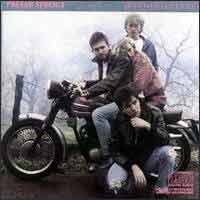 Paddy McAloons zweites Werk ist einer meiner All-Time-Favorites.
Was soll ich sagen? Dieses Album sollte in einer besseren Welt in jeder
Plattensammlung stehen!
Paddy McAloons zweites Werk ist einer meiner All-Time-Favorites.
Was soll ich sagen? Dieses Album sollte in einer besseren Welt in jeder
Plattensammlung stehen!
